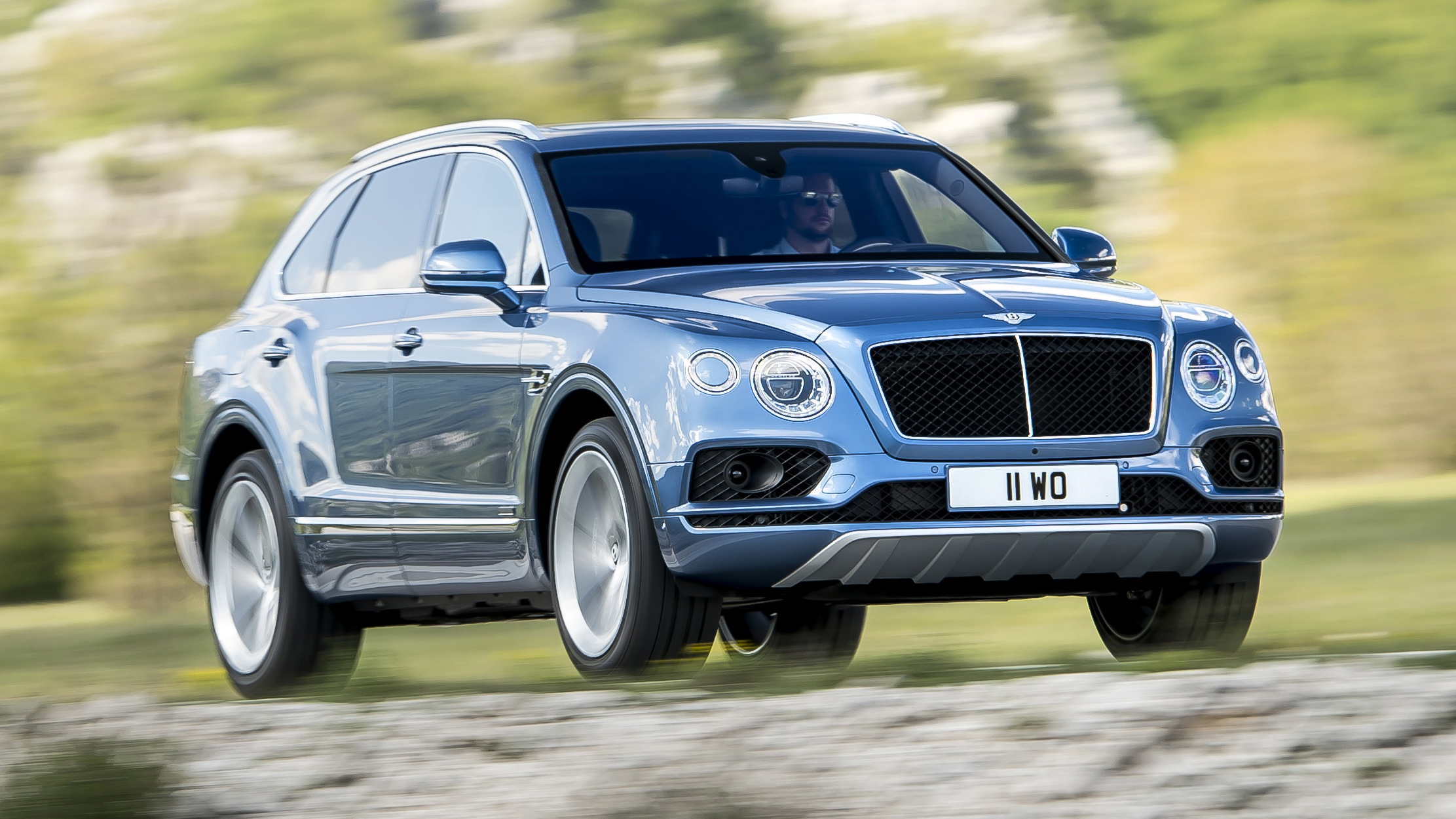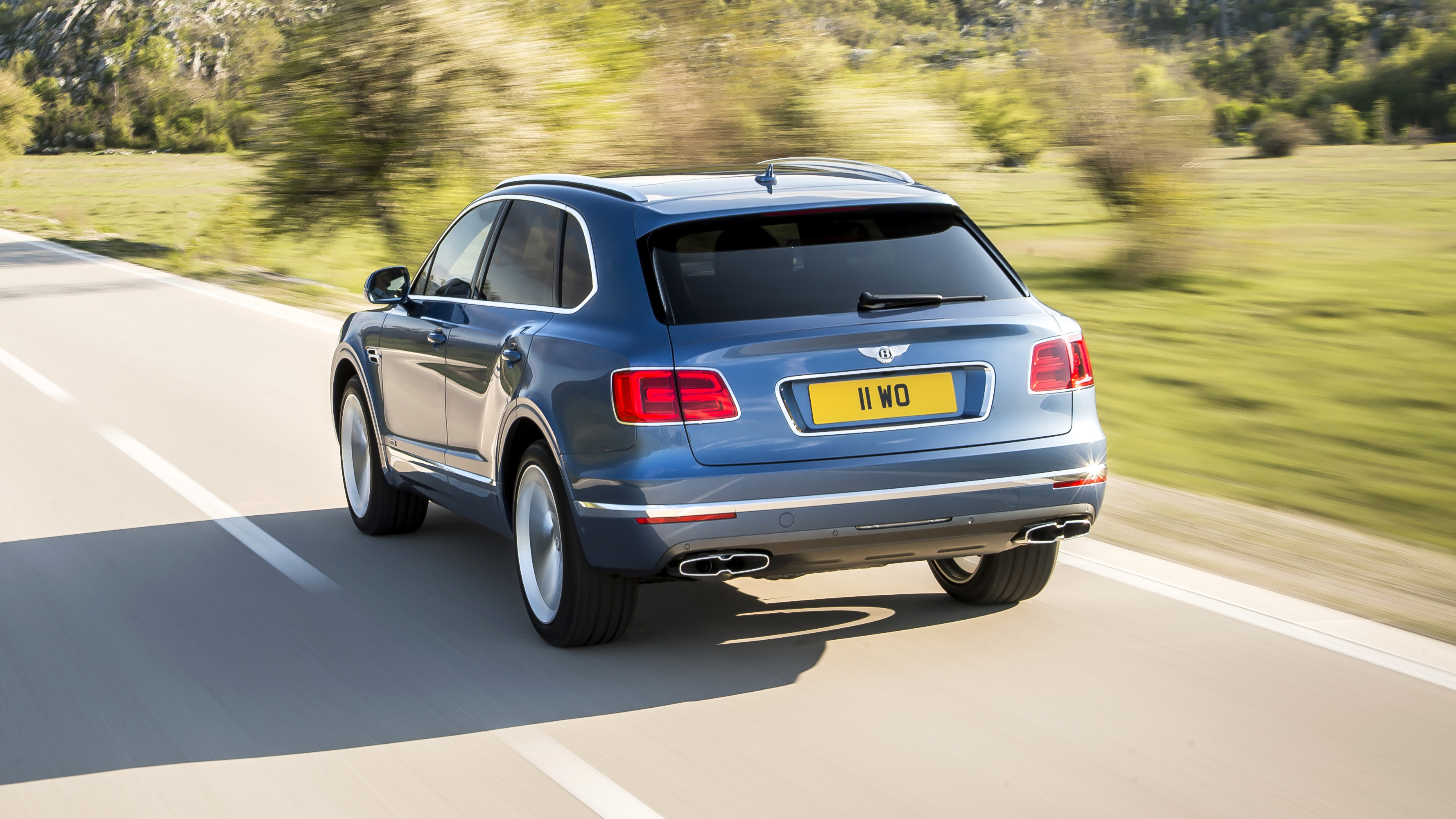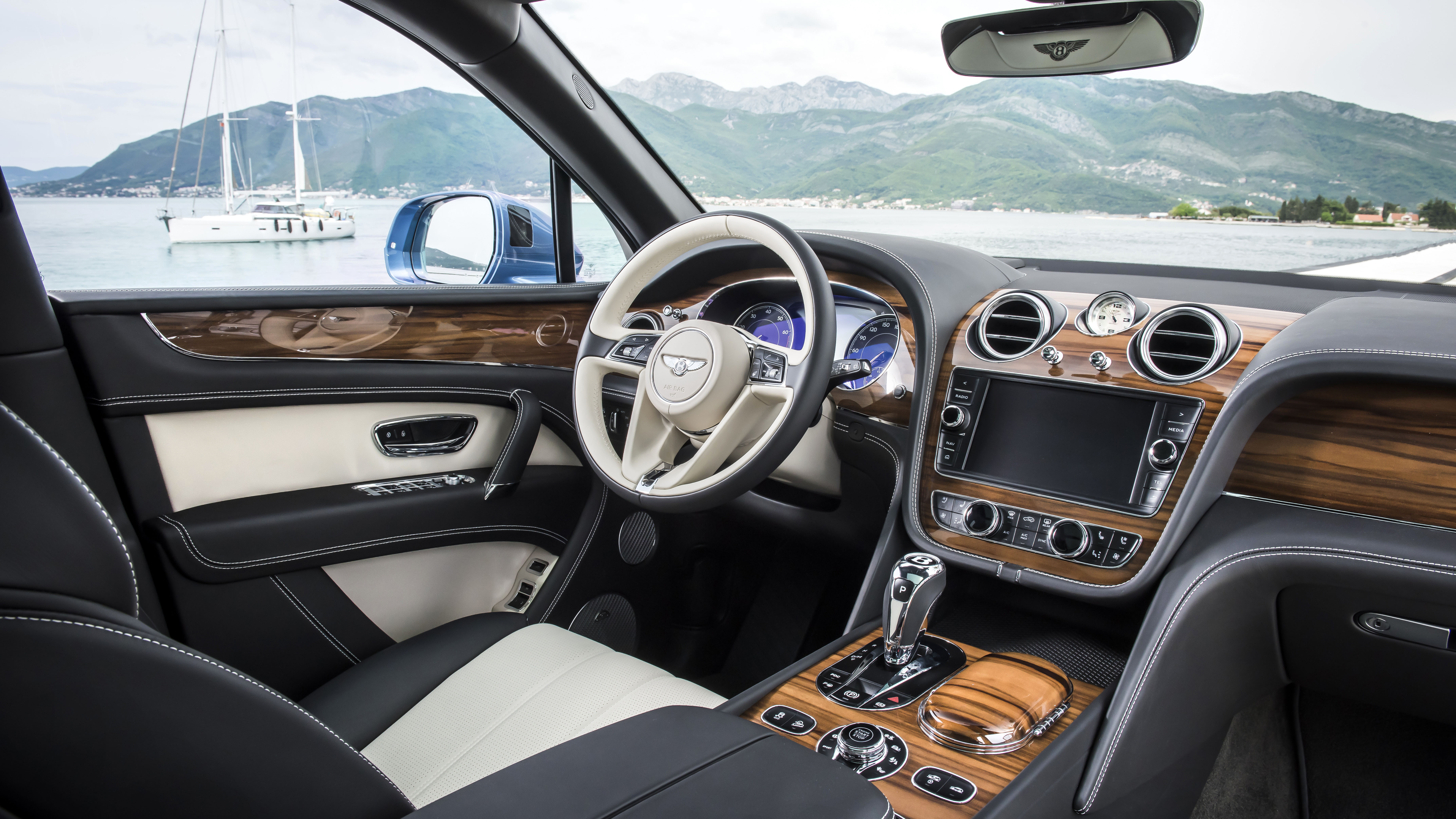
Bentley Bentayga Diesel review: 429bhp super SUV tested
A diesel Bentley review? Pigs might…
They’ve flown. What we have here is a Bentley Bentayga SUV powered by a similar V8 diesel to the Audi SQ7. There’s a lot of clever technology packed within, not least a triple-charged 4.0-litre engine.
That develops 429bhp and 664lb ft of torque, the latter from only 1,000rpm. And yes, you did read that right: maximum torque at 1,000rpm. 0-62mph takes 4.8secs and top speed is 168mph.
Those figures would seem to be adequate…
Yep, it develops as much torque as Bentley’s W12 petrol Bentayga and makes it available 350rpm sooner, and although it isn’t quite as startlingly rapid on paper (the numbers for the W12 are 4.0secs to 62mph and a 187mph maximum), it makes up for that by being much cleaner (210g/km of CO2 plays 296g/km) and more efficient (35.8mpg on the combined cycle for the diesel, against 21.6mpg). That makes the Bentayga diesel the cleanest, most efficient Bentley ever.
Odd time to be launching it though – diesel’s been getting a bad rap lately.
Yep, the mayors of Paris, Madrid, Athens and Mexico City want diesel banned by 2025. A London ULEZ (Ultra Low Emissions Zone) is planned to come into force in September 2020, likely to charge all diesels £10 to drive into the city.
These targets are aimed more at delivery vehicles, but they will purposefully sweep all passenger cars up as well due to their higher outputs of noxious gases – specifically NOx (Nitrous Oxide).
But it’s not just diesel, though. By 2030 Germany wants to ban all sales of petrol and diesel. The Dutch want to achieve that five years sooner. So this is a broader issue than just ‘diesel is bad’, and for the most part these are intentions at the moment, not laws.
Still, doesn’t give the Bentayga diesel the strongest platform from which to spring into the future…
Top Gear
Newsletter
Thank you for subscribing to our newsletter. Look out for your regular round-up of news, reviews and offers in your inbox.
Get all the latest news, reviews and exclusives, direct to your inbox.
True, but then the diesel Bentley isn’t intended to sell in all markets. This is an almost exclusively European car. It will make it to South Africa and Australia, but it won’t be marketed in America or China.
This isn’t a ‘because we could’ Bentley. A diesel Bentayga has been planned since the very beginning, and Bentley freely admits it has trialled diesel before, putting the old V10 TDI from the Touareg, amongst other VW group diesels, into various saloons, to see if it made sense.
It never did, until the latest 4.0-litre V8 oil-burner came along, made possible by the more powerful 48-volt electrics, which were initially needed to run the anti-roll system, but also gave the car the power to support an electric air compressor.
Do you mean a third turbo?
Sort of, but this one isn’t run by exhaust gases like the two tucked into the vee of the V8. Instead, it’s spun up in quarter of a second by a 7kw electric motor, feeding air into the engine at lower engine speeds than the conventional turbos can manage.
Powered by battery, it’s essentially needed purely for initial response, as its job is done once the first turbo starts puffing properly, feeding air down the same intake. As the revs rise past 2,200rpm, sliding cams open the second exhaust valve on each cylinder, activating the second turbo, so that above 2,700rpm, the engine is huffing and puffing all the air it can manage.
Due to the electronic management of the torque, 664lb ft is available in short order anywhere between 1,000 and 3,200rpm.
Is there any lag?
There is, but it’s so slight as to be practically absent. Bentley claims the engine ramps up a second faster than it would without the compressor, and in reality, as long as you have somewhere north of 1,800rpm on the dial, the Bentayga takes flight with startling rapidity.
It’s the fastest SUV in the world, says Bentley, although the claimed 0-62mph time is only 0.1 seconds faster than the Audi SQ7, and how that’s possible when the Audi is around 100kg lighter, I’m not sure. Possibly a bit of internal VW Group politics at work there.
Isn’t the engine identical, though?
No. The power and torque figures are the same, but the calibration of the engine is entirely different. Audi’s SQ7 is a more sporting application, whereas for Bentley, refinement is everything. So the engine timing is different, the exhaust is different, the sound deadening is different. The list goes on. And there’s no artificial noise enhancement.
Is it a proper Bentley then?
Absolutely. I’ve never driven a smoother diesel. There is noise, or rather an awareness of noise, but only in the same way that you’re aware of a W12 – it’s a background hum. Unless you’re standing outside, where there is a detectable diesel clatter. Even then it’s not offensive, though.
Inside, the engine note isn’t as deep and woofly as the W12’s, but there’s no vibration, no intrusion, no rattle or clank. And that’s true at any point in the rev range. It’s at its best at around 2,000rpm, but the way the Bentayga maintains its composure all the way round to 5,200rpm is uncanny.
If there’s a disconnect, it’s the huge amount of torque that’s delivered with such little fuss. This is what the W12 manages and the diesel is no different – it’s every bit as effortless, but much more efficient.
Bentley claims 35.8mpg and OK, you’re not going to get that, but we got 29.1mpg on the motorway and 23.5mpg in the hills of southern Spain. Fine, that doesn’t sound remarkable, but remember in the petrol you’re doing well to average 18mpg.
But wealthy people don’t care about economy.
They do care about range, though, and the diesel ups the distance you can travel between fill ups by between a quarter and a third. I reckon it’s the difference between travelling 300 miles before you have to start looking for fuel and 450 miles. One stop on the continental haul to the Riviera rather than two. Although you will have to juice it full from the smelly pump, of course.
Does diesel make sense in the Bentayga?
It does. The power delivery and speak-softly-carry-big-stick character fits the Bentayga every bit as well as the W12. I reckon that if you didn’t tell your passengers, they’d never guess the Bentayga was diesel powered.
And does it look any different?
It has a black grille, slightly altered tailpipes and a deletable diesel badge on the front wing. Bentley debated whether it should have one at all, but as Bentley’s chief executive, Wolfgang Dürheimer commented last night, there are some buyers who want people to know their Bentayga is a diesel.
Reading between the lines, that’s a tacit acknowledgement that some onlookers perceive the Bentayga as a needlessly profligate SUV (no comment from us…), so some owners might like to be able to point at a badge and say ‘no, look, it’s a diesel…’
Still ugly though.
Not going to disagree with that. There’s something about the proportions that jars. It’s better inside, where the quality is unimpeachable, the materials majestic. There is no other SUV, not even a Range Rover, that comes close to the tactility the Bentayga offers. That said, the cabin is complex, arguably over-burdened with electronics – but isn’t everything these days?
It’s logical enough, mind you, and although I wouldn’t describe rear space as palatial, rear seat passengers aren’t going to complain too much. But given the exterior dimensions, you expect a bit more. Boot space as well as rear legroom.
Does it handle?
The basics of the driving are fantastic. It’s a silent cruiser, steers precisely enough and the active anti-roll is uncanny at keeping the body level and getting the best from the hard-pressed (literally) tyres. Just don’t think it’s a sports SUV in the mould of a Cayenne, because it’s not. This is a GT SUV.
It’s every bit as responsive and sporting as the W12. Which is to say not very, but also to point out that the diesel is by no means the weaker choice. You need to know that the anti-roll system isn’t standard here, and you have to have it.
How much does the diesel cost?
It starts at £135,800, which is £24,400 less than the W12, potentially opening up the Bentayga to a (slightly) less affluent market. In the UK Bentley believes it could account for 50 per cent of sales – which incidentally, are very healthy at the moment. Bentley expected to sell 3,600 Bentaygas this year, but has actually produced 5,600.
So diesel works, then. What’s next?
Well, Bentley has no intention of putting this diesel into any other car in the range. As for Bentayga, there’s a plug-in hybrid coming, likely early in 2018. Mated to the W12, Dürheimer claims it’ll have a 50km e-range. That’s not bad, but it’s still not going to travel as far as the diesel between fill ups.
Featured







